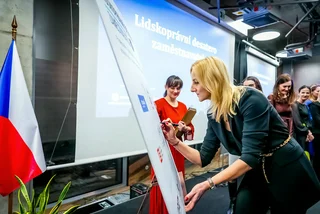There are few sectors of the economy which have been more closely affected by events of recent years than the logistics industry. Companies providing shipping services have had to think creatively to meet ever increasing demand amid volatile circumstances.
For DHL Express, one of the world’ biggest delivery companies, the answer to this challenge lies in its people. The company puts employee development at the heart of its operations, encouraging individual success while emphasizing the importance of shared knowledge and experience.
The company’s need for a skilled workforce in Czechia is greater than ever amid labor shortages, energy challenges, a sustainable innovation drive, and impressive growth boosted by the Covid pandemic. Expats.cz sat down with DHL’s CEO for Central Europe John Cornish to discuss the company’s approach to people and the planet.
Given the importance of DHL’s international network, how has Brexit changed things?
New travel and VAT rules resulting from Brexit affected our business on a global basis. We now have a lot more customs experts, as a large part of the volume now requires formal clearance. There was a long preparation process and educating markets to be ready was our biggest challenge. We had to adapt; we adapted well, and we’ve been able to continue supporting our customers.
Are you now seeing a shift back to more traditional working habits post-pandemic?
For roles which allow for flexibility, that flexibility is available in our business. At the same time, our approach is that it’s effective to be in connection with each other. Coming to work, if you’re happy to do so, is available, and we think being together with colleagues allows our network to operate most effectively.
So we encourage coming to work, and we also encourage the ability to work remotely where possible. Some people need to be able to work from home, and that will continue, as it will for anyone else who requires flexibility. But what I see is that in excess of 50 percent of people are back at work. They want to interact. Through our steps to make offices safe, it has now become a matter of personal choice.
Did the pandemic increase public demand for your services?
It’s common knowledge that the e-commerce world did in eighteen months what it was expecting to do in ten years. It was the same for us, and the growth continues. Our challenge was having the capacity for customers with significantly increased demand. We were delighted with our ability to build our network up, and we were able to react to the increased volume, even though we faced challenges.
E-commerce will thrive even in the difficult global economic situation caused by covid and the conflict in Ukraine. This belief is based on research by DHL and the Stern School of Business, called the DHL Trade Growth Atlas. International e-commerce is now 10% above pre-pandemic levels and growing steadily.
And what about labor shortages? Many companies in Czechia are struggling to find workers; are you facing similar problems?
Business in all our countries in Central Europe requires flexing operations up and down. The last quarter is typically the busiest, but increasingly, the whole year is busy. For this, you need a huge set of permanent and temporary staff.
But we’re working in an environment where it’s harder to locate the right people. The number of vacancies we have is what we’d expect; but it takes a little longer for us to fill those vacancies. That’s why we spend so much time thinking about people; finding people, recruiting people, making sure we’re the right company for people who want to join, and making everyone feel comfortable and engaged.
Is DHL boosting representation for women in senior leadership roles?
Diversity and inclusion have been part of our business since we formed, and across the fourteen countries in Central Europe, we have at least a 50/50 mix for senior management team leaders.
But diversity and inclusion isn’t just about gender, and our development programs are relevant for everyone, because it’s all about performance. If I’m competing for a role, I want to be considered based on me alone. I don’t think others are any different in this regard.
Our programs ensure that people are encouraged to talk and put their hand up for jobs. That’s the kind of environment that we try to create. It’s about making sure people feel included so that when an opportunity comes up, they can be put forward and considered on equal terms, and that the best person wins.
Can you outline how DHL goes about educating employees and helping them grow?
This is something that we think about all day. People are at the center of everything we do, and that’s not just some glib statement. I’ve been in DHL for more than 36 years, and from day one training has always been a huge focus.
We have a program called Certified International Specialist (CIS), which operates across all our divisions. The CIS training platform is a modular program that covers culture, knowledge, and leadership training and engagement activities. It provides the specialized knowledge our people need to do their job competently and confidently.
CIS starts as an introduction to DHL; two weeks before they join, new employees are introduced to what we are philosophically and culturally as a company. Then, they can start their journey of education, which encompasses the skill sets you need for the department you’re in. There’s an overarching supervisory program which is provided for all supervisors, and there’s also a Certified International Management Program for management.
We all have a DHL passport, and for each program, you get a stamp. The passport shows your individual journey. And the secret sauce which makes it all a success is that we ourselves run the program; I run a certain number of sessions every year.
Are employees able to switch their career path within the company, and does CIS help with this?
People have to work out what their ambitions are; they have to decide for themselves what their development plans are, and then decide what to do about it.
After a talk with the manager to figure out if their goal is realistic, they’d together work out what needs to be done; in some cases, taking an MBA program might be needed, or some cross-divisional experience from working in another country. But the journey is available to everyone, in any field they want.
Each country also has its own specific programs. These include functions for sales, operations, customer service, HR, finance, and so on. They allow people to participate, grow, and be considered regionally.
John Cornish began his career in the UK in 1984 and gradually worked in various management positions in the DHL Express network and in many countries including the UK, Belgium, Bulgaria, Malaysia, and Hong Kong. Now he manages a CEU region with 23 countries. He is a big sports fan and especially enjoys rugby, of which he was himself a player and coach and is now a passionate fan. He likes to unwind with a good book or movie, too.
Does employee training often entail working in other countries?
Does everyone travel? No, not everyone wants to. But through these processes we can move people and give them experience. You might join a project team in another country for three months; or, you might travel there for just a couple of days but be in the program for longer.
DHL has a goal to achieve net-zero emissions by 2050 and to significantly reduce its greenhouse gas emissions by 2030. What is your strategy for emissions reduction?
Our responsibility towards the environment continues to be a major focus for us at DHL Express and remains one of the key pillars of our group's long-term strategy. We are modernizing our aircraft and vehicles, while expanding logistics hubs and sorting centers to meet growing customer demand. At the same time, we are investing in greener and more sustainable solutions, such as Sustainable Aviation Fuel and Electric Vehicles.
In the first half of this year, we signed contracts with Neste and bp to significantly increase our use of sustainable jet fuel. In addition, we continue to invest in the electrification of our last-mile fleet. And at the same time, we are establishing partnerships with new airlines, this year for example with CargoJet and Singapore Airlines.
DHL Express is also the first customer to order 12 “Alice” e-cargo aircraft from Eviation. Alice can be flown by one pilot and its load capacity is 1200 kilograms. Charging takes around 30 minutes per flight hour, and the maximum range is up to 815 kilometers. Alice produces no carbon emissions, which is significant as a 2020 study found that the aviation sector accounts for 3 percent of global carbon emissions, and that this proportion could increase to 24 percent by 2050 due to increased demand for passenger and cargo flights.
After the first successful test flight for "Alice", flying for a total of eight minutes and reaching an altitude of 1,067 meters, the era of sustainable aviation is finally here. Alice will initially help our operations in the US, taking us closer to our goal of significantly reducing our carbon footprint and ultimately achieving zero emissions.
So there are things we can all do. Effectiveness and productivity are key, and here again, personal training is really important. If we really know our roles, we can contribute to ensuring not only that customers’ shipments are delivered safely, but also that this is being done in the most sustainable and effective way possible.
This article was written in cooperation with DHL Express. Read more about our partner content policies here.












 Reading time: 7 minutes
Reading time: 7 minutes 






















